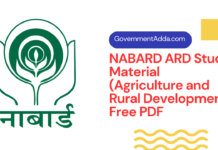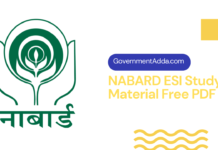Complete NABARD Syllabus for Prelims & Mains
Syllabus for NABARD 2019 : NABARD Exam Pattern & Syllabus for Phase 1 & 2, Latest Syllabus for NABARD Exam (Stage 1 & 2), NABARD Complete Syllabus for Prelims & Mains, NABARD Detailed Syllabus , NABARD Phase 1 & Phase 2 Full Syllabus. “NABARD Study Material PDF“
So the candidates who are going to attend the Exam can look at the NABARD syllabus here. Hope these Details will help you at the time of your Exam Preparation. Hence check complete syllabus & Exam Pattern for NABARD and start your Exam Preparation as early as possible.
For NABARD Preparation Join Our Telegram Group Now >> Click Here
For Best Handwritten Notes for All Subjects & Trades Join Our Telegram Channel >> Click Here
NABARD Prelims 2019 – Syllabus
NABARD Syllabus for English
- Reading Comprehension
- Cloze test (Both New and old pattern)
- Error Spotting (Both New and old pattern)
- Para jumbles
- Spotting Errors
- Sentence Improvement
- Fill in the Blanks
- Theme-based or Odd one out Questions
- Sentence Connectors
- Mis-spelt word/ Idiom-Phrase/ Odd one out based Questions
NABARD Syllabus for Quantitative Aptitude
- Number Series
- Simplification/ Approximation
- Quadratic Equations
- Data Sufficiency
- Data Interpretation
- Missing DI sets
- Double Diagram DI
- Caselet DI
- Data Sufficiency
- Mathematical inequality
- Age based problems
- Profit, Loss and Discount
- Simple and Compound Interest
- Time, Work and Wages
- Mixture and Alligation
- Speed, Time and Distance
- Pipes and Cisterns
- Probability
- Partnerships
- Ratio and Averages
NABARD 2019 Reasoning Syllabus
- Puzzles
- Circular Seating Arrangement
- Linear Seating Arrangement
- Arrangement & Pattern
- Double Line-up
- Inequality ( Old/ New)
- Syllogism ( Old/ New)
- Input-Output
- Data Sufficiency
- Logical/ Verbal Reasoning
- Coding-Decoding
- Blood Relations
- Direction Sense
- Order & Ranking
- Series based questions
NABARD Mains 2019 – Syllabus
Paper I – English: Essay, Précis writing, Comprehension and Business/Office Correspondence. The paper on English shall be framed in a manner to assess the writing skills including expressions and understanding the topic.
NABARD Syllabus 2019 : Descriptive Exam
- Essay Writing
- Letter Writing
- Paragraph Writing
- Precise Writing
Paper II – Economic & Social Issues and Agriculture & Rural Development
Economic & Social Issues: Nature of Indian Economy – Structural and Institutional features – Economic underdevelopment – Opening up the Indian Economy – Globalisation – Economic Reforms in India – Privatisation. Inflation – Trends in Inflation & their Impact on National Economy and Individual Income. Poverty Alleviation and Employment Generation in India – Rural and Urban – Measurement of Poverty – Poverty Alleviation Programmes of the Government. Population Trends – Population Growth and Economic Development – Population Policy in India. Agriculture – Characteristics / Status – Technical and Institutional changes in Indian Agriculture – Agricultural performance – Issues in Food Security in India – Non Institutional and Institutional Agencies in rural credit. Industry – Industrial and Labour Policy – Industrial performance – Regional Imbalance in India’s Industrial Development – Public Sector Enterprises. Rural banking and financial institutions in India – Reforms in Banking/ Financial sector. Globalisation of Economy – Role of International Funding Institutions – IMF & World Bank – WTO – Regional Economic Co-operation. Social Structure in India – Multiculturalism – Demographic trends – Urbanisation and Migration – Gender Issues Joint family system – Social Infrastructure – Education – Health and Environment. Education – Status & System of Education – Socio -Economic Problems associated with Illiteracy – Educational relevance and educational wastage – Educational Policy for India. Social Justice: Problems of scheduled castes and scheduled tribes – socio-economic programmes for scheduled castes and scheduled tribes and other backward classes. Positive Discrimination in favour of the under privileged – Social Movements – Indian Political Systems – Human Development. Current Economic & Social Issues.
Agriculture & Rural Development: Agriculture: definition, meaning and its branches, Agronomy: definition, meaning and scope of agronomy. Classification of field crops. Factors affecting on crop production, Agro Climatic Zones; Cropping Systems: Definition and types of cropping systems. Problems of dry land agriculture; Seed production, seed processing, seed village; Meteorology: weather parameters, crop-weather advisory; Precision Farming, System of Crop Intensification, organic farming;
a) Soil and Water Conservation :Major soil types, soil fertility, fertilisers, soil erosion, soil conservation, watershed management;
b) Water Resource:Irrigation Management: types of irrigation, sources of irrigation, crop-water requirement, command area development, water conservation techniques, micro-irrigation, irrigation pumps, major, medium and minor irrigation.
c) Farm and Agri Engineering: Farm Machinery and Power, Sources of power on the farm- human, animal, mechanical, electrical, wind, solar and biomass, bio fuels, water harvesting structures, farm ponds, watershed management, Agro Processing, Controlled and modified storage, perishable food storage, godowns, bins and grain silos.
d) Plantation & Horticulture:Definition, meaning and its branches. Agronomic practices and production technology of various plantation and horticulture crops. Post-harvest management, value and supply chain management of Plantation and Horticulture crops.
e) Animal Husbandry:Farm animals and their role in Indian economy, Animal husbandry methods in India, common terms pertaining to different species of livestock, Utility classification of breeds of cattle. Introduction to common feeds and fodders, their classification and utility. Introduction to poultry industry in India (past, present and future status), Common terms pertaining to poultry production and management. Concept of mixed farming and its relevance to socio-economic conditions of farmers in India. Complementary and obligatory nature of livestock and poultry production with that of agricultural farming.
f) Fisheries:Fisheries resources, management and exploitation – freshwater, brackish water and marine; Aquaculture- Inland and marine; biotechnology; post-harvest technology. Importance of fisheries in India. Common terms pertaining to fish production.
g) Forestry:Basic concepts of Forest and Forestry. Principles of silviculture, forest mensuration, forest management and forest economics. Concepts of social forestry, agroforestry, joint forest management. Forest policy and legislation in India, India State of Forest Report 2015. Recent developments under Ministry of Environment, Forest and Climate Change.
h) Agriculture Extensions:Its importance and role, methods of evaluation of extension programmes, Role of Krishi Vigyan Kendra (KVK) in dissemination of Agricultural technologies.
i) Ecology and Climate Change:Ecology and its relevance to man, natural resources, their sustainable management and conservation. Causes of climate change, Greenhouse Gases (GHG), major GHG emitting countries, climate analysis, distinguish between adaptation and mitigation, climate change impact to agriculture and rural livelihood, carbon credit, IPCC, UNFCCC, CoP meetings, funding mechanisms for climate change projects, initiatives by Govt of India, NAPCC, SAPCC, INDC.
j) Present Scenario of Indian Agriculture and Allied activities;recent trends, major challenges in agriculture measures to enhance viability of agriculture. Factors of Production in agriculture; Agricultural Finance and Marketing; Impact of Globalization on Indian Agriculture and issues of Food Security; Concept and Types of Farm Management.
Rural Development: Concept of Rural Area, Structure of the Indian Rural Economy Importance and role of the rural sector in India- Economic, Social and Demographic Characteristics of the Indian rural economy, causes of Rural Backwardness.
Rural population in India; Occupational structure, Farmers, Agricultural Labourers, Artisans, Handicrafts, Traders, Forest dwellers/tribes and others in rural India- Trends of change in rural population and rural work force; problems and conditions of rural labour; Issues and challenges in Handlooms
Panchayati Raj Institutions – Functions and Working. MGNREGA, NRLM – Aajeevika, Rural Drinking water Programmes, Swachh Bharat, Rural Housing, PURA and other rural development programmes.
NABARD Grade A & B 2019 Complete Question Paper,Study Material, Books, Cutoff Marks, Notification, Study Plan
| NABARD Grade A & B Assistant Manager 2019 Important Links | ||
| 1. | NABARD Assistant Manager Grade A & B 2019 Recruitment Notification Apply Online | Click Here |
| 2. | NABARD Grade A & B Officers Exam Syllabus 2019 – Prelims/Mains | Click Here |
| 3. | NABARD Grade A & B Officers Exam Pattern 2019 – Prelims/Mains | Click Here |
| 4. | NABARD Grade A & B Assistant Manager Previous Year Question Papers PDF – Download Here | Click Here |
| 5. | NABARD Grade A & B Previous Year Cut Off Marks | 2017, 2016, 2015 Cut Off Marks | Click Here |
| 6. | NABARD Grade A & B Assistant Manager Study Material | Books | ESI | ARD | English | GK Pdfs | Click Here |
| 7. | NABARD Grade A & B Assistant Manager ARD Agriculture and Rural Development PDF | Notes | Books | Click Here |
| 8. | NABARD Grade A & B Assistant Manager ESI Economics & Social Issues PDF | Notes | Books | Click Here |
| 9. | NABARD Grade A & B Assistant Manager Study Plan | How To Prepare For NABARD Grade A & B Officer Exam | Click Here |
| 10. | NABARD ARD StudyPlan & Preparation Tips and Tricks for Agriculture and Rural Development (ARD) | Click Here |
| 11. | NABARD ESI Study Plan & Preparation Tips and Tricks for Economic & Social Issues(ESI) | Click Here |














